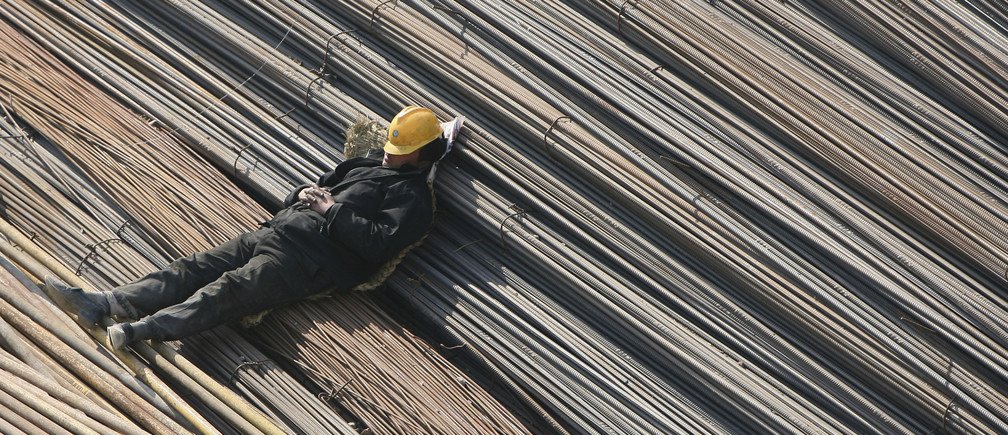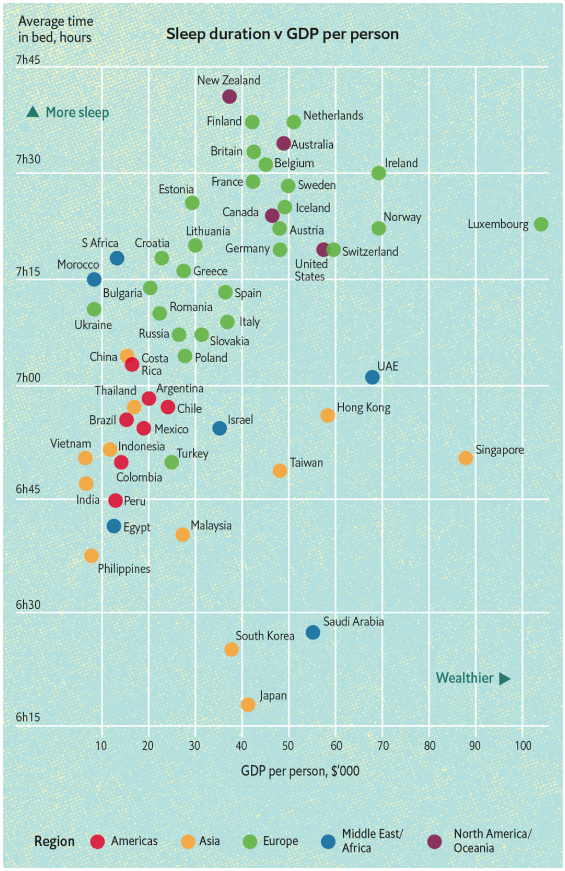
Date: 2026-01-21 Page is: DBtxt003.php txt00016520
Quality of Life
Need for Sleep
Which countries get the most sleep – and how much do we really need?
Peter Burgess

A labourer takes a nap on reinforcement bars at a construction site in Qingdao, Shandong province March 5, 2008. Chinese Premier Wen Jiabao warned on Wednesday that overheating remains his nation's top economic foe even as global growth softens, vowing a tough fight against price rises and feverish investment. Picture taken March 5, 2008. REUTERS/Stringer(CHINA) CHINA OUT - GM1E4360VUG01 Zzz... Image: REUTERS/Stringer
New report: Globalization 4.0 Read the report Most Popular This is how much veg people in the EU are really eating Niall McCarthy · Statista 11 Apr 2019 The true cost of corruption is higher than you might realise Vitor Gaspar, Paolo Mauro, and Paulo Medas · IMF Blog 11 Apr 2019 South Korea once recycled 2% of its food waste. Now it recycles 95% Douglas Broom 12 Apr 2019 More on the agenda Explore context Global Health
Explore the latest strategic trends, research and analysis
Do you lie awake at night worrying you’re not getting enough sleep? You’re not alone – some countries are in the middle of a sleeplessness epidemic which has the potential to damage people’s health and productivity.
Among the most rested countries surveyed by Sleep Cycle, an app that tracks how much shuteye people are getting, New Zealand comes top with the average Kiwi clocking up in excess of 7.5 hours per night.

Who's sleeping easy? Who's sleeping easy? Image: Matt McLean / Sleep Cycle / IMF / The Economist Finland, the Netherlands, Australia, the UK and Belgium all rank highly for sleep, too, with Ireland close behind.
But not all developed economies rest well; South Korea and Japan are the world’s worst countries when it comes to getting a good night’s sleep. The problem of sleeplessness in Japan is well-documented, particularly in relation to the phenomenon of karoshi – death caused by lack of sleep.
Sleepwalking into trouble
Thankfully, cases of karoshi are relatively rare. But long before a person’s health and wellbeing are critically endangered, sleep deprivation will eat away at their ability to do their job.
The cumulative effect of compromised productivity adds up to the equivalent of a slew of working days being lost. According to Rand Corporation, the US loses the equivalent of around 1.2 million working days per year due to people not getting enough sleep. In Japan, around 600,000 working days are lost per year, while in the UK and Germany it stands at around 200,000.
All these lost days have an unavoidable effect on a country’s economic output. The US loses approximately $411 billion a year, or 2.28% of its GDP. For Japan, that’s around $138 billion a year (2.92% of GDP). In Germany, it equates to $60 billion (1.56% of GDP) and in the UK it’s $50 billion (1.86% of GDP).
The fact that small improvements in sleep can be amplified into much larger economic gains is something of a wake-up call.
If everyone in the US who sleeps fewer than six hours a night got between six and seven hours, there would be a $226.4 billion boost to the economy. All that from what is, effectively, less than an extra hour in the land of nod each night.
This level of improvement could add around $75.7 billion to the Japanese economy, a point that hasn’t been lost on the owner of a Tokyo-based wedding company called Crazy. Last year, the firm’s CEO, Kazuhiko Moriyama announced a cash-bonus for employees who were getting at least six hours sleep a night. “You have to protect workers’ rights, otherwise the country itself will weaken,” he said.
People in Saudi Arabia, the Philippines, Malaysia and Egypt are also some of those most likely to be sleep deprived. But while the average of 7.5 hours a night that New Zealanders enjoy each night is higher than anywhere else, even that might not be enough.
The American National Sleep Foundation, recommends that adults get between seven and nine hours a night.
Share The views expressed in this article are those of the author alone and not the World Economic Forum. Subscribe for updates A weekly update of what’s on the Global Agenda Email Featured: Global Health View all This is how much veg people in the EU are really eating Niall McCarthy · Statista 11 Apr 2019 Why sleeping at work could actually make you better at your job Jamie Gruman · The Conversation 10 Apr 2019 Which countries get the most sleep – and how much do we really need? Sean Fleming 10 Apr 2019 Across the world, women outlive men. This is why Emma Charlton 09 Apr 2019 Light pollution: the dark side of keeping the lights on Bernard Coetzee · The Conversation 09 Apr 2019 How Leonardo da Vinci's sketches showed humans as complex machines Susan Broomhall and Ivan Marusic · The Conversation 09 Apr 2019 How fish slime could spawn a new kind of antibiotics Sandra Loesgen · The Conversation 08 Apr 2019
A weekly update of what’s on the Global Agenda
© 2019 World Economic Forum Privacy Policy & Terms of Service
Have you read?
How a good night's sleep can 'clean' your brain
Do sleep, don’t have doubts. Jack Ma’s guide to sanity and success
To combat Japan’s sleep debt, some firms allow tired workers to nap on the job
To sleep, perchance to dream